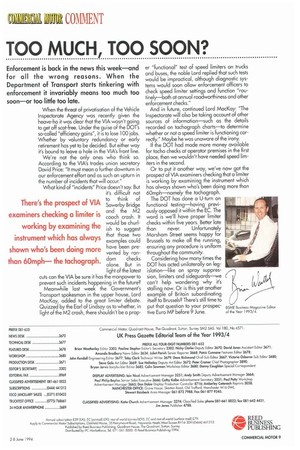TOO MUCH, TOO SOON?
Page 11

If you've noticed an error in this article please click here to report it so we can fix it.
Enforcement is back in the news this week—and for all the wrong reasons. When the Department of Transport starts tinkering with enforcement it invariably means too much too soon—or too little too late.
When the threat of privatisation of the Vehicle Inspectorate Agency was recently given the heave-ho it was clear that the VIA wasn't going to get off scot-Free. Under the guise of the DOT's so-called "efficiency gains", it is to lose 100 jobs. Whether by voluntary redundancy or early retirement has yet to be decided. But either way it's bound to leave a hole in the VIA's front line.
We're not the only ones who think so. According to the VIA's trades union secretary David Price: "It must mean a further downturn in our enforcement effort and as such an upturn in the number of incidents that will occur."
What kind of "incidents" Price doesn't say. But it's difficult not to think of Sowerby Bridge and the M2 coach crash. It would be churlish to suggest that those two examples could have been prevented by ran dom checks alone. But in light of the latest cuts can the VIA be sure it has the manpower to prevent such incidents happening in the future? Meanwhile last week the Government's Transport spokesman in the upper house, Lord MacKay, added to the great limiter debate. Quizzed by the Earl of Lindsay as to whether, in light of the M2 crash, there shouldn't be a prop
There's the prospect of VIA examiners checking a limiter is working by examining the instrument which has always shown who's been doing more than 60mph— the tachograph.
er "functional" test of speed limiters on trucks and buses, the noble Lord replied that such tests would be impractical, although diagnostic systems would soon allow enforcement officers to check speed limiter settings and function "routinely—both at annual roadworthiness and other enforcement checks."
And in future, continued Lord MacKay: "The Inspectorate will also be taking account of other sources of information—such as the details recorded on tachograph charts—to determine whether or not a speed limiter is functioning correctly." Maybe he was unaware of the irony. If the DOT had made more money available for tacho checks at operator premises in the first place, then we wouldn't have needed speed limiters in the second.
Or to put it another way, we've now got the prospect of VIA examiners checking that a limiter is working by examining the instrument which has always shown who's been doing more than 60mph—namely the tachograph. The DOT has clone a U-turn on functional testing—having previously opposed it within the EC. The word is we'll have proper limiter checks within five years. Better late than never. Unfortunately Marsham Street seems happy for Brussels to make all the running, ensuring any procedure is uniform throughout the community. Considering how many times the DOT has acted unilaterally on legislation—like on spray suppression, limiters and sideguards—we can't help wondering why it's stalling now. Or is this yet another example of Britain subordinating itself to Brussels? There's still time to put that question to your prospective Euro MP before 9 June.
















































































